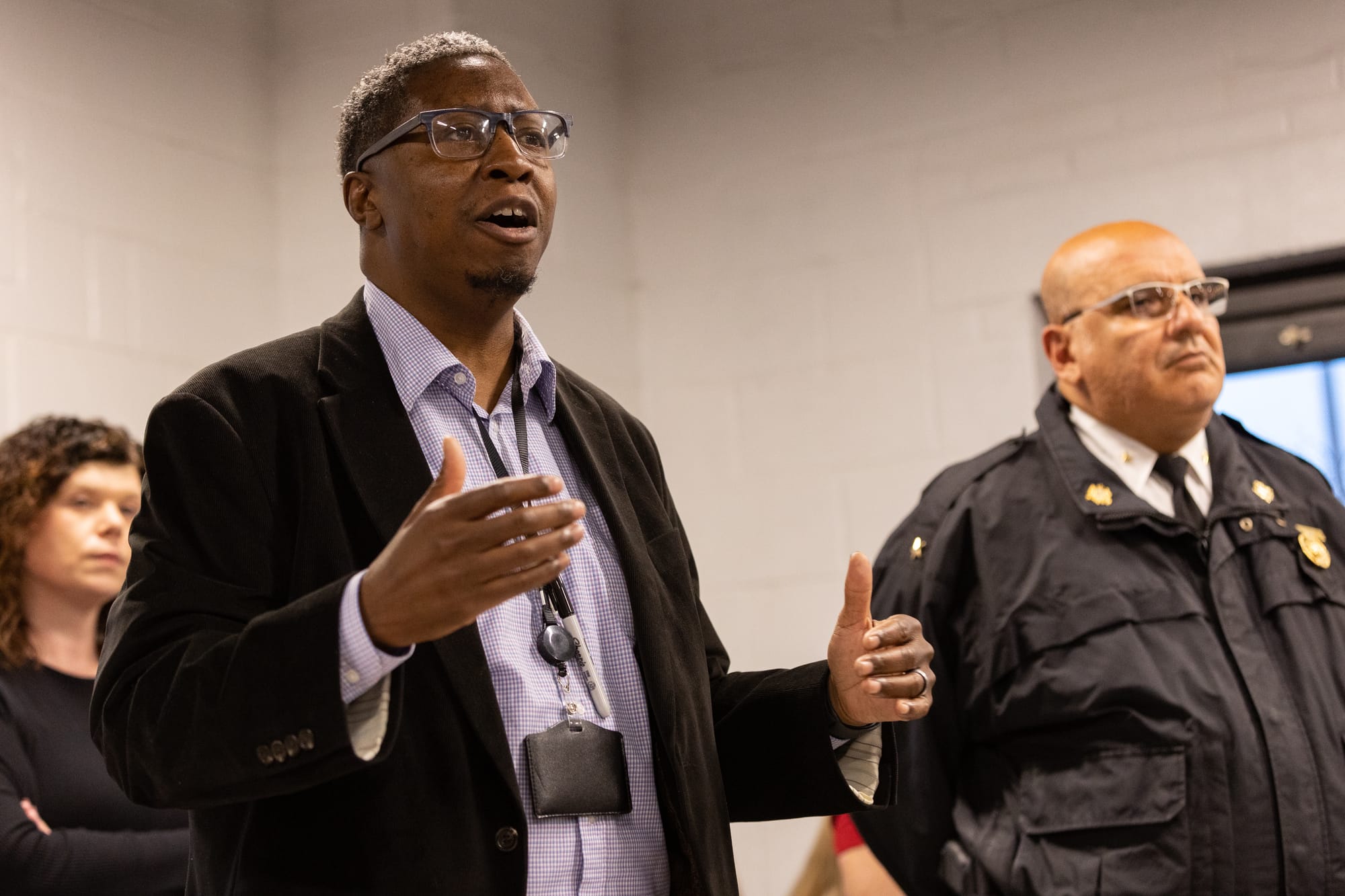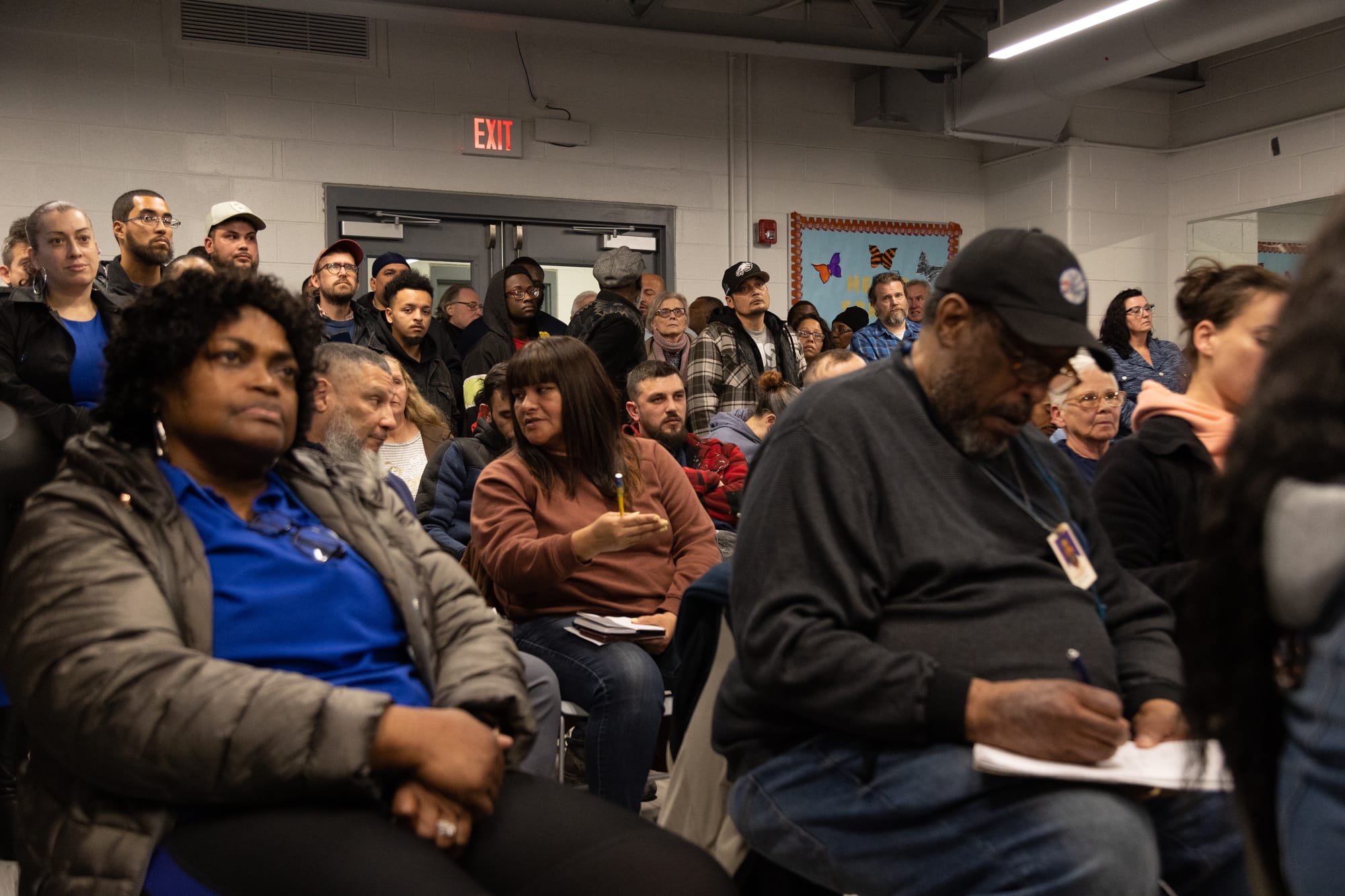Starting Tuesday, the city will increase its homeless engagement and police presence in Kensington in what city officials are describing as “blended, enhanced outreach.”
Deputy Police Commissioner Pedro Rosario and David Holloman, the interim executive director of Philadelphia’s Office of Homeless Services, announced the details at another packed Harrowgate Civic Association meeting last Thursday.
The city’s plan entails bussing unhoused residents to the surrounding counties and possible family reunification, plus increased police engagement, according to city officials. The city’s increased outreach will occur every Tuesday, Wednesday, and Thursday from 4 p.m. to 8 p.m. moving forward.
Rosario said the police department will ramp up their “service detail,” with more officers engaging “as many people as possible by any means possible,” in partnership with “all the other city agencies.”
After the engagement phase, he said they will do an “enforcement action” to target open air drug sales and violence that comes along with it. Rosario recently said he’s launching a new “temporary task force” — recruiting additional officers to increase patrolling in the neighborhood.
City outreach workers will try to decipher which unhoused residents are from Philadelphia’s surrounding counties, and send people back on buses, if they’re willing, according to Holloman.
“So the goal of these teams is to be out here, to find out who's out here,” Holloman said. “Are they from the counties? Can we get them back to the counties?”
Holloman said the city will put more resources toward its pre-existing “Stranded Traveler Assistance” program, which buys one-way bus tickets back to people’s hometowns.
“We want to try and connect you back to family reunification – Philadelphia’s limited on the resources we do have,” Holloman added.
Holloman also announced an encampment cleaning scheduled for May 8th for the 3000 and 3100 blocks of Kensington Avenue.
“We know for years the 3100 block of Kensington Avenue has been at ground zero for a lot of activities in this community here. We're trying to put a stop to that,” Holloman said.
To connect people to treatment and housing agencies in other counties, he said the city is “working with our partners to make sure that they're connecting with those county administrators to see if they're connected to already benefits in their town so they can get those proper housing and treatment resources.”
He added that he wants to connect Philadelphia residents to treatment and housing, and better understand the barriers preventing them from accessing those resources.
“I get tired of hearing people saying, ‘People can’t get into treatment,’” he said. “Let’s figure out how you get that.”

‘We’re still working on those concepts’
While both the Kensington caucus – a group of four City Council members, including Mike Driscoll, Quetcy Lozada, Mark Squilla, and Jim Harrity – and the Parker administration have endorsed the idea of “triage centers,” which give people the option to choose treatment or jail – neither the caucus nor the administration have released details about how the centers will work.
When asked if the new outreach efforts will work in concert with the triage plans, Holloman said, “Right now, we're still working on those concepts.”
There are about 2,400 emergency shelter beds and about 3,200 beds in “permanent supportive housing” for single adults in the city, according to a 2023 report by Continuum of Care, Philadelphia’s homeless assistance system.
Philadelphia’s Police Assisted Diversion program (PAD), which some consider a triage program, already has difficulty placing people into detox programs and finding long-term housing for participants. And when demand for emergency shelter rises on Code Blue nights, it’s difficult to find the space, WHYY reported.
City experts have also testified about the various treatment barriers the unhoused population faces, including Jill Bowen, the commissioner of the Department of Behavioral Health and Intellectual DisAbility Services, who during a July 2023 public hearing raised the issue of the wound care required before patients can enter detox and treatment facilities.
It’s not clear what housing or treatment options will be offered if the city is expecting an influx of participants due to the new engagement efforts.
“We're looking at all options here,” Holloman said. “All options are on the table here in terms of increase in housing opportunity in the city of Philadelphia.”
Resources in the Philadelphia suburbs are also thin.
For instance, in Montgomery County, there is no 24/7 shelter for single adults in the county open year-round, after two facilities closed in 2022 — Montgomery County’s CHOC in Norristown and Al’s Heart Warming Center in Pottstown.
“People still need a place to shelter, and if you haven’t solved that need you haven’t solved anything,” said Eric Tars, senior policy director of the National Homelessness Law Center.
Tars said if city leaders are going to transport people to the suburbs as a solution to homelessness, they should ensure they are connecting with services or family on the other end.
“And if you don't have those things, then my assumption is you're just trying to get rid of people.”

‘It’s still a wait-and-see’
On Thursday, many residents at the Harrowgate Civic Association meeting were eager for increased police enforcement to begin and some wanted more details from the city.
“It's still a wait-and-see,” said Shannon Farrell, president of Harrowgate Civic. “There's still a lot of, ‘We have a plan. We're going to do it, but we don't really know all the details.’”
Farrell wants to know what options will be available to unhoused residents and those living with addiction, including where Mayor Cherelle Parker will put the proposed triage centers, how many beds they’ll have, and whether they’ll offer wound care.
“It won't work unless there's a place for them to be because then what are they choosing?” Farrell said.
“Everybody's telling us there's plenty of places for them. That's not what we've heard for years.” she added.
Long-time Kensington resident Filgia, who declined to share her last name, pleaded to Rosario for more policing.
“I’m picking up feces in front of my home ... I cannot have humanity to people who are not respecting my boundaries at all. And I have to cry about it because it’s depressing and upsetting, what I’m going through,” Filgia said.
She said people sell drugs on the corner near her house and others often deface her property by sleeping on her porch and stealing her trash cans and flowers.
“I have respect that you have an addiction, that you need help and whatever else,” she said. “But you also have to respect that this is my property.”
Mayor Parker’s 100th day in office will be April 11, 2024.
Have any questions, comments, or concerns about this story? Send an email to editors@kensingtonvoice.com.

